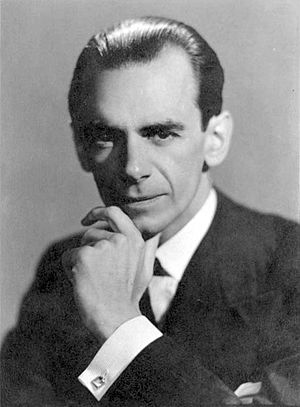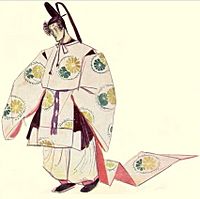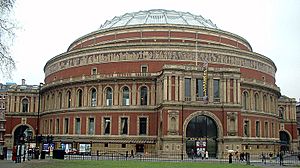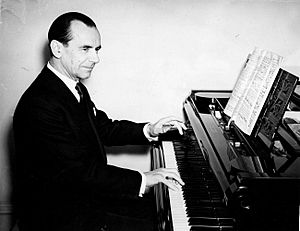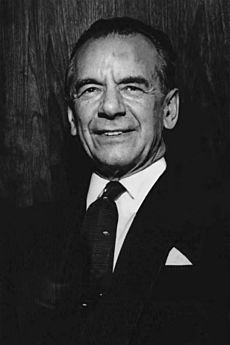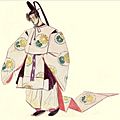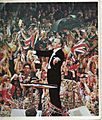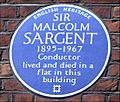Malcolm Sargent facts for kids
Sir Malcolm Sargent (born April 29, 1895 – died October 3, 1967) was a famous English conductor, organist, and composer. He was known as one of Britain's best conductors, especially for music with choirs. He worked with many famous groups like the London Philharmonic Orchestra, the Hallé Orchestra, and the BBC Symphony Orchestra.
Sargent was very respected by choirs and solo musicians. However, he had very high standards, and sometimes his relationship with orchestra players was difficult. Even so, he helped start the London Philharmonic Orchestra and played a big part in saving the Royal Philharmonic Orchestra from closing down in the 1960s.
From 1947 to 1967, Sargent was the main conductor of the BBC Proms, a famous summer music festival in London. This made him one of the most well-known English conductors. When he started, he and two helpers conducted the whole two-month season. By the time he passed away, many international guest conductors also helped.
When World War II began, Sargent chose to return to Britain. He wanted to bring music to as many people as possible to help lift spirits during the war. He was also famous on BBC radio. Many fans of Gilbert and Sullivan operas know his recordings of their popular shows. He traveled all over the world and was known for his conducting skills, his support for British composers, and his stylish look. This earned him the nickname "Flash Harry."
Contents
Early Life and Musical Journey
Malcolm Sargent was born in Ashford, Kent, on April 29, 1895. His father was a church organist and an amateur musician. Malcolm started learning piano and organ at a young age. He went to Stamford School from 1907 to 1912. When he was just 13, he made his stage debut in The Mikado. The next year, he conducted for the first time when the usual conductor was away.
After school, Sargent trained to be an organist at Peterborough Cathedral. At 16, he earned a diploma from the Royal College of Organists. By 18, he had a music degree from Durham University.
Starting His Career
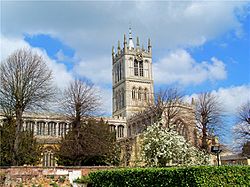
Sargent's first job was as an organist at St Mary's Church, Melton Mowbray, from 1914 to 1924. He was chosen out of more than 150 applicants! During this time, he also worked on many music projects in Leicester and Stamford. He conducted and produced operas by Gilbert and Sullivan for local groups. At 24, he became England's youngest Doctor of Music.
His big break came in 1921. Sir Henry Wood, a famous conductor, visited Leicester and asked Sargent to write a piece of music. Sargent wrote a short orchestral piece called An Impression on a Windy Day. It was too late for Wood to learn it, so Sargent conducted it himself. Wood was impressed and invited Sargent to conduct the piece at the Proms in London. This was Sargent's London debut.
Sargent was also a composer for a short time. However, on the advice of Sir Henry Wood, he soon focused only on conducting. In 1922, he started the amateur Leicester Symphony Orchestra. He conducted this orchestra until 1939, and it became very famous, attracting top soloists.
Becoming Nationally Famous
In the 1920s, Sargent became one of England's most well-known conductors. In London, he conducted the Robert Mayer Concerts for Children from 1924 to 1939. He also conducted opera tours, earning praise from music critics. In 1925, he conducted his first broadcast for the BBC. He would go on to do over two thousand more broadcasts in the next four decades.
In 1926, Sargent began working with the D'Oyly Carte Opera Company, which performed Gilbert and Sullivan operas. He conducted their London seasons. His performances were very popular, and an early BBC radio broadcast of The Mikado in 1926 was heard by up to eight million people. This was a huge audience for that time!
In 1927, Sargent conducted for the Ballets Russes, a famous ballet company. In 1928, he became the conductor of the Royal Choral Society. He held this job for 40 years until he died. This society was famous for performing Samuel Coleridge-Taylor's Hiawatha at the Royal Albert Hall. Sargent's name soon became linked with this work.
In 1929, a series of popular concerts called the Courtauld-Sargent concerts began. Sargent was the chief conductor. These concerts aimed to attract new audiences to classical music. They were very successful and helped make Sargent even more famous. At first, the London Symphony Orchestra played for these concerts. But when they refused to replace some players Sargent thought weren't good enough, Sargent helped create a new orchestra, the London Philharmonic Orchestra.
Sargent conducted a wide range of music and made many recordings. He was especially known for his performances of choral pieces, like Handel's Messiah. He often joked that his career was built on "the two M's – Messiah and Mikado." He also strongly supported British music. He conducted the first performances of important works by composers like Gustav Holst, Ralph Vaughan Williams, and William Walton.
Challenging Times and War Years
In 1932, Sargent became very ill with tuberculosis. He couldn't work for almost two years. It took him some time to fully return to conducting. In 1936, he conducted his first opera at Covent Garden.
Sargent was very popular with choirs, but sometimes had difficulties with orchestras. In 1936, he gave an interview where he said that orchestral musicians shouldn't expect a "job for life." This upset many musicians, especially since they had supported him during his illness. After this, he often faced challenges with British orchestras.
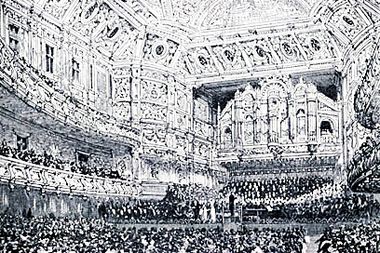
Sargent was very popular in Australia and New Zealand, where he toured three times starting in 1936. He was about to take a permanent job there when World War II started. He felt it was his duty to return to Britain. During the war, Sargent led the Hallé Orchestra and the Royal Liverpool Philharmonic. He also became a popular radio broadcaster, helping to boost public morale with his concerts. He often conducted for very low fees. Once, an air raid interrupted a concert. Sargent calmly stopped the orchestra, told the audience they were safer inside, and then continued conducting. He later said the orchestra played better than ever, and the audience listened with incredible focus. In May 1941, he conducted the last concert at the Queen's Hall before it was destroyed in an air raid.
In 1945, the famous conductor Arturo Toscanini invited Sargent to conduct the NBC Symphony Orchestra in America. Sargent chose to present mostly English music in these concerts.
Leading the Proms
Sargent was knighted in 1947 for his contributions to music. He continued to perform in many countries and promoted British composers. He conducted the first performances of Walton's opera Troilus and Cressida (1954) and Vaughan Williams's Symphony No. 9 (1958).
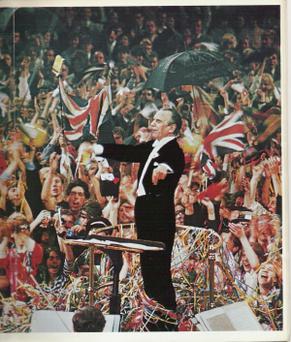
Sargent was a very important figure at the Proms after the war. He was the chief conductor from 1947 until his death in 1967, leading 514 concerts. In 1947, a Prom concert he conducted was the first classical concert ever shown on British television. As the Proms conductor, he became widely famous. He turned the "Last Night" of each season into a popular, exciting celebration, known for its flag-waving and fun atmosphere. He was known for his witty speeches where he playfully teased the audience. He often included choral music and British composers in his programs, but he conducted a wide variety of music. During his time, many famous foreign conductors and orchestras also started performing at the Proms.
Sargent was also the chief conductor of the BBC Symphony Orchestra from 1950 to 1957. Although some within the BBC had concerns, his work with the orchestra was praised by many outside the BBC. The orchestra's reputation grew during his time. He conducted the concerts that opened the Royal Festival Hall in 1951. He also returned to the D'Oyly Carte Opera Company for special seasons in the 1950s and 1960s.
International Tours and Final Years
Sargent made two tours of South America in 1950 and 1952, conducting in cities like Buenos Aires and Rio de Janeiro. Half of his music on these tours was by British composers.
When the Royal Philharmonic Orchestra was in danger of closing after its founder's death in 1961, Sargent played a big part in saving it. This helped him regain the respect of orchestral musicians. In the 1960s, he toured many countries, including Russia, the United States, Canada, and Australia.
By the mid-1960s, his health began to get worse. His last concerts were in July 1967 with the Chicago Symphony Orchestra. He conducted works by Holst, Vaughan Williams, Delius, and Sibelius.
Sargent had surgery for pancreatic cancer in July 1967. He made a final appearance at the Last Night of the Proms in September that year, passing the baton to his successor. He died two weeks later, at the age of 72, and was buried in Stamford.
Musical Style and Works
Many famous musicians, including Toscanini, believed Sargent was the best choral conductor in the world. He was known for making choirs sing with incredible energy and skill. While some thought he didn't always explore music deeply enough, he was praised for his "great all-rounder" abilities.
Even though some orchestral players had issues with him, instrumental soloists generally loved working with Sargent. Famous soloists like Pierre Fournier, Artur Schnabel, and Yehudi Menuhin spoke highly of him. They felt he understood what they wanted from the music. Because of this, Sargent was always in demand to conduct concertos (pieces for a solo instrument and orchestra).
The Times newspaper said Sargent was the most respected British conductor by the public. He was a talented pianist, could read music scores brilliantly, and was skilled at arranging music. His conducting technique was considered one of the best and most reliable in the world. He was particularly good at performing music written during his lifetime, making it clear and exciting.
Sargent regularly conducted works by many famous composers from different periods. These included Bach, Handel, Mozart, Beethoven, Brahms, Tchaikovsky, and Dvořák. He was a big supporter of British composers like Edward Elgar (especially his choral works and symphonies), Holst, Vaughan Williams, and Walton. He also conducted works by Bartók, Prokofiev, Shostakovich, and Sibelius.
Legacy and "Flash Harry"
Sargent was a member of several famous clubs, including The Literary Society and the Beefsteak Club. He was also involved in public service, including being president of the RSPCA (Royal Society for the Prevention of Cruelty to Animals).
Despite some of his traits, Sargent had many friends. Sir Thomas Armstrong remembered him as kind and generous. Even so, some friends found him a bit of a "bounder" (a person who behaves badly). However, Sargent was a deeply religious man throughout his life. On his deathbed, he received visits from religious leaders and calls from Queen Elizabeth and Prince Charles. He also made up with his son, Peter, from whom he had been estranged.
Why "Flash Harry"?
Sargent's nickname, "Flash Harry," was first used by orchestral players before World War II. It wasn't meant as a compliment at first. It might have come from his very neat and stylish appearance – he always wore a red or white flower in his buttonhole. This was perhaps combined with his fast conducting speeds early in his career. Another story says it was because he would rush from one recording session to another. The nickname "Flash Harry" was used long before the cartoon character of the same name appeared in 1954. Sargent's devoted fans, the Promenaders, later used the nickname in a positive way, sometimes shortening it to "Flash." Sargent himself wasn't very fond of the nickname.
Sargent had a friendly rivalry with another famous conductor, Sir Thomas Beecham. They even shared the same birthday! When Sargent was ill, Beecham conducted a concert to raise money for him. Beecham often made jokes about Sargent, but he also praised him, calling him "the greatest choirmaster we have ever produced."
Honors and Ways He is Remembered
Besides his own doctorate, Sargent received honorary degrees from Oxford and Liverpool and other music academies. He received the highest honor of the Royal Philharmonic Society, its Gold Medal, in 1959. He also received honors from Sweden, Finland, and France.
After his death, Sargent was remembered in many ways. His memorial service in Westminster Abbey in October 1967 was attended by 3,000 people, including royalty and many famous figures.
Since 1968, the Proms have started on a Friday evening, and a large choral piece is usually performed in memory of Sargent's work with choirs. A school in Stamford, the Malcolm Sargent Primary School, and a charity, the Malcolm Sargent Cancer Fund for Children, were named after him. This charity later merged and is now called Young Lives vs Cancer, helping children with cancer. In 1980, the Royal Mail put Sargent's image on a postage stamp. There is also a blue plaque outside his former home in London, near the Albert Hall, to remember him.
Recordings
Sargent's own composition, An Impression on a Windy Day, has been recorded. His first recordings as a conductor were in 1923. In the early days of electrical recording, he helped make a pioneering live recording of music from Mendelssohn's Elijah.
Later, Sargent was very popular for recording English music, choral works, and concertos. He made many recordings with orchestras like the BBC Symphony Orchestra, the London Symphony Orchestra, and the Royal Philharmonic Orchestra.
English Music Recordings
Sargent conducted Gilbert and Sullivan recordings over four decades. He made early recordings with the D'Oyly Carte Opera Company, including The Yeomen of the Guard (1928) and The Pirates of Penzance (1929). More than 30 years later, he recorded Yeomen (1964) and Princess Ida (1965) again with the same company. Between 1957 and 1963, he also recorded nine Gilbert and Sullivan operas for EMI, using a larger choir and soloists from opera.
During World War II, Sargent recorded the Delius Violin Concerto. Later, in 1965, he recorded Delius's Cello Concerto with the famous cellist Jacqueline du Pré. After the war, Sargent recorded music by Elgar. His 1945 recording of Elgar's The Dream of Gerontius is still considered a classic. He also conducted recordings of Elgar's Violin Concerto with Jascha Heifetz and the Cello Concerto with Paul Tortelier. He recorded Elgar's Pomp and Circumstance Marches and the Enigma Variations.
Sargent made two recordings of Holst's The Planets: one in 1950 and a stereo version in 1960. He also recorded shorter Holst pieces.
In 1958, Sargent recorded Walton's Belshazzar's Feast, which was one of his specialties. This recording has been reissued many times. He also recorded Walton's Orb and Sceptre March and Façade Suites. He made a stereo recording of Walton's First Symphony with the composer present.
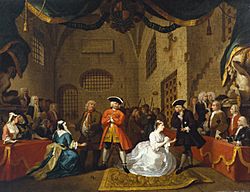
Sargent also recorded Vaughan Williams's Fantasia on a Theme by Thomas Tallis and Serenade to Music. In 1962, he made a stereo recording of Coleridge-Taylor's Hiawatha's Wedding Feast with the Royal Choral Society. In 1963, Sargent recorded Gay's The Beggar's Opera, one of his few opera recordings outside of Gilbert and Sullivan.
Other Choral Recordings
Sargent recorded Handel's Messiah four times (in 1946, 1954, 1959, and 1964). Although his large-scale versions were different from how the music was originally played, they are now seen as important historical recordings. He also recorded Handel's Israel in Egypt and Mendelssohn's Elijah in 1947.
Concerto Recordings
Sargent was often asked to conduct concertos for recordings. Besides those mentioned earlier, he conducted concertos by many other composers. These included Bach, Beethoven, Bruch, Dvořák, Mendelssohn, Mozart, Rachmaninoff, and Tchaikovsky. He worked with famous soloists like David Oistrakh, Mstislav Rostropovich, and Cyril Smith.
Other Notable Recordings
Sargent recorded Beethoven's Fourth and Fifth Symphonies. His 1961 stereo recording of the Eroica Symphony has been reissued. He was a big fan of Sibelius's music and recorded pieces like Finlandia, En saga, and the Karelia Suite with the Vienna Philharmonic. He also recorded Sibelius's First, Second, and Fifth Symphonies with the BBC.
Sargent recorded a wide variety of other European composers, including Chopin's Les Sylphides ballet suite, Haydn's Symphony No. 98, and Wagner's "Prelude" from Das Rheingold. He recorded Smetana's complete Má vlast cycle in 1964. With the Royal Opera Orchestra, he recorded Rossini's William Tell and Schubert's Unfinished Symphony.
With the LSO, he recorded Mussorgsky's Pictures at an Exhibition and Prokofiev's Symphony No. 5. With the Philharmonia, he recorded Rachmaninoff's Rhapsody on a Theme of Paganini and Tchaikovsky's Variations on a Rococo Theme. With the BBC, he recorded Rachmaninoff's Symphony No. 3, Handel's Water Music, and Tchaikovsky's Symphony No. 5. He also conducted one of Britten's most famous works, The Young Person's Guide to the Orchestra, in 1946 and 1958. Sargent also narrated and conducted Instruments of the Orchestra, an educational film.
Images for kids
-
St Mary's Church, Melton Mowbray, where Sargent was an organist
-
Inside the Queen's Hall
-
Sargent conducting the Proms
-
A painting based on The Beggar's Opera by William Hogarth
See also
 In Spanish: Malcolm Sargent para niños
In Spanish: Malcolm Sargent para niños
 | William L. Dawson |
 | W. E. B. Du Bois |
 | Harry Belafonte |


